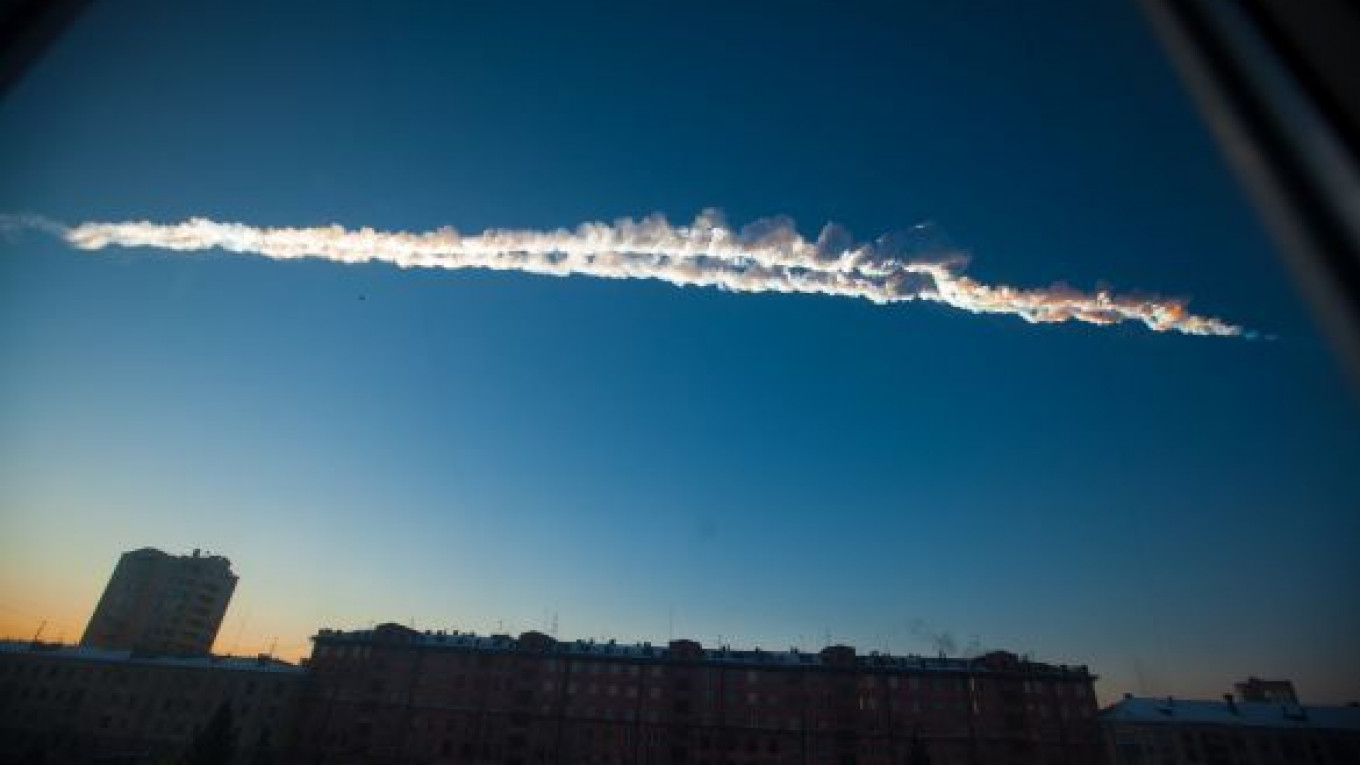Space officials, scientists and military personnel will combine forces to develop a strategy for detecting and countering threats from outer space, Russia's top space official said Tuesday.
Federal Space Agency head Vladimir Popovkin told a Federation Council roundtable on "space threats" that his agency had formed a working group with the Defense Ministry and Russian Academy of Sciences, and that it was time for government agencies to work together to shield Earth from falling space objects, Interfax reported.
Popovkin's comments come almost a month after Russia was left reeling from a devastating meteor strike near the Urals city of Chelyabinsk.
The meteor strike injured more than 1,500 people, the majority of whom suffered cuts from shattered glass, and caused more than $33 million in damage, prompting heightened awareness of the dangers of objects hurtling toward our planet.
Among immediate steps to monitor space threats, Popovkin cited observing and cataloging small space objects, developing an action plan in case of major strikes and organizing missions to study potentially destructive asteroids, comets and meteors.
"We have sufficient resources [for these tasks], but they are currently being spent on specific agency-level projects," he said, adding that the task of shielding the planet warranted international cooperation.
The space chief said that government agencies would jointly draft a federal program on countering asteroid strikes by year-end, but that they would only start developing ways to neutralize dangerous space objects five to seven years from now.
Neither Russia nor the United States is currently able to shoot down fast-moving space objects, only detectable using high-power astronomical telescopes.
At the same meeting, Anatoly Zaitsev, director of the nonprofit Planetary Defense Center, presented a separate system for defending Earth, dividing potential space threats into two categories: short-term and long-term.
Zaitsev said short-term threats could be negated by using one spacecraft to monitor approaching space objects and sending another to destroy celestial bodies with nuclear weapons or deflect them by other means.
"With the help of this layer [of defense], we will be able to protect Earth from objects up to 100 meters in size, which account for 99.5 percent of asteroids approaching our planet," he said, adding that such a system could be developed within five years and would cost several billion dollars.
To destroy larger space objects, Zaitsev said governments would have to deploy super-powerful atomic bombs, the like of which have never been seen.
"This would require greater expense and a longer time frame, but it would stimulate the creation of new technologies," he said, admitting that such weapons would have to be carefully regulated to prevent them from falling into the wrong hands.
An unmanned spacecraft will be sent to Mars in 2016 to start a search for life under a joint program that Russia will sign this week with the European Space Agency, Popovkin told journalists after the Federation Council roundtable, Interfax reported.
The program, called ExoMars, envisages several Mars launches, including an orbiter, a stationary lander and a rover, in 2016 and 2018.
Contact the author at [email protected]
A Message from The Moscow Times:
Dear readers,
We are facing unprecedented challenges. Russia's Prosecutor General's Office has designated The Moscow Times as an "undesirable" organization, criminalizing our work and putting our staff at risk of prosecution. This follows our earlier unjust labeling as a "foreign agent."
These actions are direct attempts to silence independent journalism in Russia. The authorities claim our work "discredits the decisions of the Russian leadership." We see things differently: we strive to provide accurate, unbiased reporting on Russia.
We, the journalists of The Moscow Times, refuse to be silenced. But to continue our work, we need your help.
Your support, no matter how small, makes a world of difference. If you can, please support us monthly starting from just $2. It's quick to set up, and every contribution makes a significant impact.
By supporting The Moscow Times, you're defending open, independent journalism in the face of repression. Thank you for standing with us.
Remind me later.






